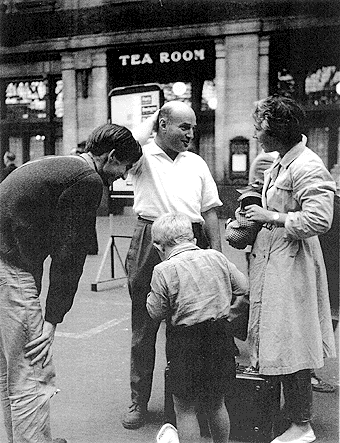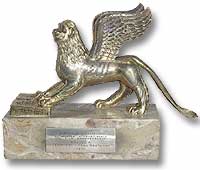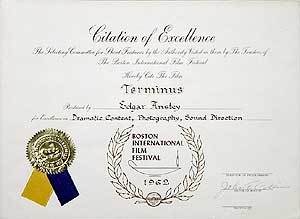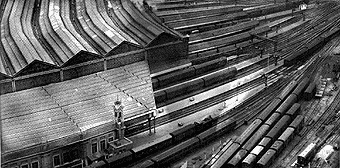 |
16mm & 35mm

The Venice Film Festival Award

Citation for Excellence, 1962 Boston International Film Festival, USA
 |
|
On the concourse and platforms of a large railway station you can hear the rhythm of the city and watch the most poignant moments of private lives become public property: grief and joy, meeting and parting, high comedy and near tragedy. Here, for a brief moment, the traveller may confront the station staff with a personal crisis while his neighbour looks on, or passes by to catch a train. To the accompaniment of Ron Grainer's music, and Julian Cooper's songs, this film captures the atmosphere of London's Waterloo station. The first cinema film directed by John Schlesinger. Awarded fourteen international film honours, including the British Film Academy Award, and the Grand Prix and the Venice Film Festival.
16mm & 35mm
|
|
|
Additional Information - Steven Foxon (Screenonline): Dawn over the Thames. The magnificent glass roof of Waterloo Station, its many tracks exiting it in a beautiful sweeping curve. On the roof of a nearby building, blackened by coal smoke, a bee keeper pulls out a section of a hive, revealing the buzzing workers performing their waggle dance...
Feet, brollies, The Times. The Station Master enters through the worn door of his office. The surprisingly modern looking interior of the main signal box. At the flower shop, a city gent buys his daily lapel rose. Slow feet on the tube platform. The announcer in her glass roof box announces a departure.
A group of Jewish people, nuns, drinking lads, middle-aged ladies; emotional platform partings. Steam trains puff fitfully. Steam exits from couplings; a small child bends down to see. A young trainspotter receives medical attention for a smoke smut in his eye.
People point at Waterloo's magnificent wooden timetable board, faces puzzled, resigned, sad, tired, confused. A guard blows his whistle. Glasses. Waiting, porters. Pulling and releasing of the steel levers in the signal box that change the points.
Arrivals: flowers, happy meetings, eyes searching. One person hasn't arrived; flowers are left on a wooden bench. Enquiries: queues, irritation.
Prisoners being transferred - Police, handcuffs. Carriage doors slam, a train pulls out. Camera angles from inside and out of the carriages. The signal box cat. A hand tears down a small notice on the inside of a carriage window.
The huge lost property room, awash with umbrellas. Pin-up pictures adorn the inside of a locker door. Confetti; a honeymoon departure. On the platform, a coffin is loaded into the guard's van. Some now familiar station staff; a destitute old lady.
Several Jamaicans - some in wide brimmed hats and sharp suits; one, in working clothes, is suspicious of the camera. Light illuminates the rails in their tight banked curve out of the station. The southern English upper-classes returning from Europe. Pullman carriages, waving, the deafening sound of steam.
A little boy lost, upset, clinging a toy seal. A policeman pulls him away firmly under Waterloo's famous clock to the Station Master's office, where, after a station announcement, his mother comes to collect him.
A Southern Railways sign. Escalators up from the tube. The wooden curves of the old-style station W.H. Smiths. The names of the Southern Region destinations echo gently around the station and are seen on boards and signs.
A criss-cross iron platform gate closes; an electric train leaves the station. Drinking in the station bar.
11 pm. A girl drinks a carton of Kia-Ora. A still locomotive hisses, surrounded by steam. Two sailors are engulfed by cigarette smoke. People sleep on benches. The destitute old lady reappears, in her strange garb and heavy make-up. She rustles through litter. Broad brooms sweep the ground. Below platform level, a man delicately taps the wheels of carriages with a 3 foot long steel hammer. Platform lights switch off. An endless curve of connected baggage wagons circles slowly.
Dawn over the station and the City again: The massive bulk of St. Paul's is clearly visible in the half-light.
Capturing a single day at Waterloo station, Terminus combines two kinds of documentary filmmaking: a sort of cinema verité , a 'true' record of life passing by, and little stories that emerge, vanish, then reappear later in the film. Its many different perspectives - close-ups, long-shots, high and low angles - keep things lively. Every time you watch it you notice some new, pleasing detail. Unlike the GPO Film Unit's Night Mail (d. Harry Watt, 1936), there is no narration. Instead, Terminus's carefully chosen on-location sound recordings complement, and are equal to, the images.
John Schlesinger's short reveals how democratising railways were. In 1961, everybody used the train; in a single day, the film catches vignettes from childhood, marriage, work, crime and punishment, old age, death. One could go practically anywhere by train, and Schlesinger knew that, as he so movingly showed in Billy Liar (1963), to get on a train could change your life. Only two years before Dr Beeching's cuts, one might expect a service very shortly to be decimated to look run down, but the station is alive, vital. There is an obvious pride in the railway etched on many of the characters' faces.
What of the people in Terminus? Are they really us? The suits, hats and pointy glasses perhaps now seem strange and unfamiliar. But the class divisions of British Rail trains are not so very different from today - even though the three classes of travel became two after nationalisation in 1948. The boat trains and beautiful Pullman carriages are now replaced by the Eurostar.
Terminus has deservedly won countless awards. The equally famous and much loved Night Mail seems patronising by comparison, annoying in its jokiness and light-weight artiness. Terminus's images and soundtrack are a serious business.